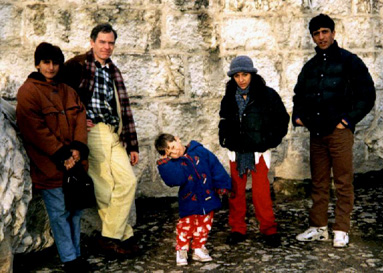It is Christmas eve, the feast -
they say at the camp - during which Christians celebrate the new year.
The whole ice-cold night goes by. At dawn, you can hear a strange creaking
sound: the prams, loaded with children, are coming back after a night's
begging. The whole camp has gone mangela, entrusting its misery
and its desires, sometimes false but sometimes dramatically real, to the
pity of the world. They are many, too many, competing with each other,
there are more Roma than donors in Brescia. So streams branch off into
neighbouring villages.
Reska too goes mangela, once a week
in one place only, on market day. It was a hard decision to go; she had
lost the art during the years spent in better circumstances, when her father
was working and the family was still small. But just as she was beginning
to dream how to escape from the camp, she realized that she had no choice:
Bajram, who would work one day and the next have to stay at home, is responsible
for the upkeep of no less than ten people.
Reska goes to the market. She sits on a cushion,
and lets people see the irons that hold up her legs. She waits for people
to come up and give her something. Then, speaking with the sellers, she
has them make her small gifts, and each one comes with an anecdote. Reska
has a strange charm, a perfect synthesis between beauty and frailty, coming
with a strong and straightforward character. Half the market takes a liking
to her. Besides actual needs, mangela is this as well: friendships
and stories.
One freezing cold day in January, Reska
is sitting in the market, and a policeman comes up to her.
"You can't stay here."
"Why not?"
"You are making trouble for people."
That moment, a lady who has a stand at the
market calls Reska by her name and tells her she wants to give the girl
some blankets and sheets.
The policeman is curious, and tries to understand
the relationship between Reska and the people of the market.
"But why do you go asking for alms?"
"Because I am a foreigner and an invalid".
"But if you are an invalid, how did you get
here?"
"Driving my car."
"You mean you have a car and go begging?"
"Do you see my car, parked over there? It
is the smallest kind of car there is, it's fifth hand and my father bought
it in instalments since the bus stop is two miles away from the camp."
Reska starts to tell the story of her whole
family, the policeman listens and then walks away, turning his head every
now and then to look at her, and quietly repeating her name.
You are welcome to use this article
on condition that you put the whole text of "Collateral Lives" on your
website and provide a link to http://www.kelebekler.com/
